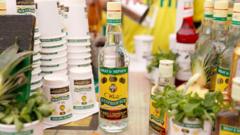Rum culture is deep-rooted in Jamaica's identity, but a clash over its definition is heating up. Producers are struggling over what it really means to call a spirit "Jamaican rum." At the center of this legal dispute is a recent amendment by Jamaica's Intellectual Property Office (JIPO) blocking rum aging outside the island, a rule touted by the Spirits Pool Association (SPA) to enhance the geographical indication (GI) for Jamaican rum.
The amendment aims to defend Jamaica's prized rum against overseas competitors and firmly establish its premium identity in key markets including the EU and the US. However, National Rums of Jamaica (NRJ) is protesting this move. They argue that the new regulations could jeopardize their business model that relies on aging rum abroad, which has been the norm for centuries.
With the change, prominent distilleries like Long Pond might face hardship as they strive to adapt. Critics highlight that the SPA's push for local aging enhances authenticity and supports Jamaica's economy through local processing benefits, which include rum tourism—a burgeoning industry for island visitors.
Amidst the arguments, rum lovers everywhere are eager for clarity on what it will take for Jamaica to maintain its reputable standing in the global alcohol market. The case’s outcome may shift definitions, affecting rum's legacy, taste, and its significant place in Jamaican culture. Are we witnessing the dawn of a new era for rum? Only time will tell!



















